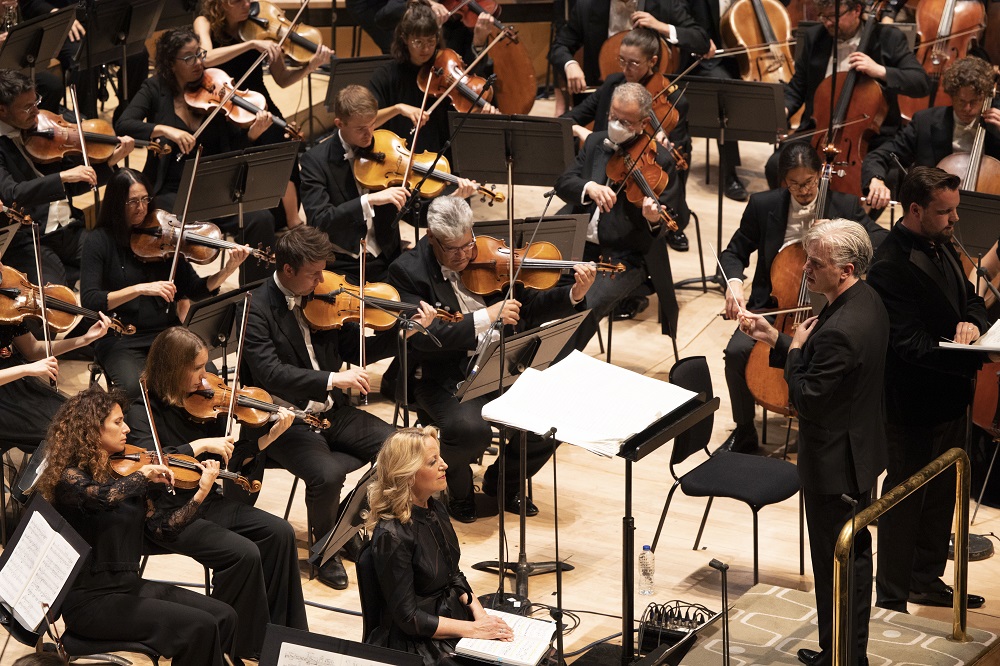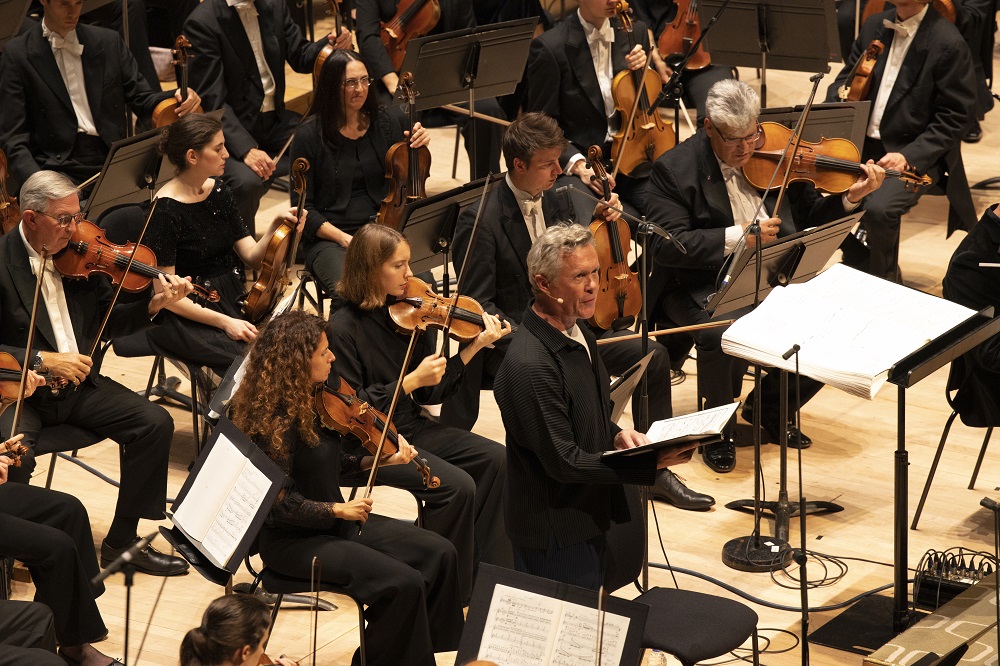Gurrelieder, LPO, Gardner, RFH review - everything in place, but still something’s missing | reviews, news & interviews
Gurrelieder, LPO, Gardner, RFH review - everything in place, but still something’s missing
Gurrelieder, LPO, Gardner, RFH review - everything in place, but still something’s missing
Schoenberg's epic of love, death, afterlife and earthly regeneration sold a bit short

Schoenberg’s “Song of the Wood Dove” takes up a mere 11 of the 100 minutes of his epic Gurrelieder, though it’s a crucial narrative of how King Waldemar of Gurre’s beloved Tove was murdered by his jealous queen. Last night, as in Simon Rattle’s 2017 Proms performance, stunning mezzo Karen Cargill came on stage, immediately in character, and with no reference to the score on the stand in front of her, showed everyone else how to do it.
At that point temperatures finally rose. They were to do so again, fitfully, in the rest of the work, where God-challenging, undead Waldemar leads his vassals in a supernatural wild ride, finally yielding to summer and sunrise. But for all Edward Gardner’s hard work on detail with his London Philharmonic Orchestra, pointing the way to the later, post-romantic Schoenberg which partly manifests.itself in the competion of the epic, a sense of occasion and the mind-pictures it needs to ignite rarely materialised.
The presence of both London Philharmonic and London Symphony voices, well drilled, made this feel like an extension of the Proms’ two-choirs spectaculars. But it also made us aware that big choral works like this often need the enveloping glow of the Albert Hall colosseum. The Royal Festival Hall is too dry a space for the dusky glitter of the opening, and in the nine richly-orchestrated Lieder which follow – Waldemar and Tove singing of their love and fears, yet apart – we also missed crucial luminosity in the soprano part, only adequately sung by Lisa Lindstrom (pictured below on the left with Gardner, David Butt Philip and LPO players). Tove should be cast with a Liù, not a Turandot. David Butt Philip, right at the start of a daunting season which will see him take on so many major heroic tenor roles, had the baritonal colour needed right at the start as well as the ringing top notes, but seemed too score-bound. Only after the interval, in his accusation of God as tyrant, did the drama leap off the page, and with full vocal security.
David Butt Philip, right at the start of a daunting season which will see him take on so many major heroic tenor roles, had the baritonal colour needed right at the start as well as the ringing top notes, but seemed too score-bound. Only after the interval, in his accusation of God as tyrant, did the drama leap off the page, and with full vocal security.
The “Wild Hunt” had due impact with the wall of men’s choruses, Wagner’s Gibichungs on steroids – but there are surely also echoes of the judgement-day canvas in Mahler’s “Resurrection” Symphony. Schoenberg’s melodic inspiration is very much his own, but the Danish original source of Jens Peter Jacobsen only highlights the patchwork nature of the drama’s progress. Robert Murray, like Cargill, truly performed his odd narration as the dead jester dragged along with the ghosts’ high noon, but then we hit a stumbling-block. Supertitles had kept us fully informed of the German text’s meaning, but for some reason the LPO had spent money on commissioning an English translation by Jeremy Sams of the quirky “melodrama” depicting “the Wild Hunt of the Summer Wind”.  Alex Jennings (pictured above) played his part well, if with a touch of the Edith Sitwells; but why didn’t they call upon a German Lieder singer to manage the Spechstimme, the then-new demand for speaking on approximate pitches and in strict rhythm? Someone like Stephan Loges would have done it to perfection, as Thomas Quasthoff did for Rattle in 2017 (and I remember an octogenarian Hans Hotter in Paris).
Alex Jennings (pictured above) played his part well, if with a touch of the Edith Sitwells; but why didn’t they call upon a German Lieder singer to manage the Spechstimme, the then-new demand for speaking on approximate pitches and in strict rhythm? Someone like Stephan Loges would have done it to perfection, as Thomas Quasthoff did for Rattle in 2017 (and I remember an octogenarian Hans Hotter in Paris).
No matter; the final sunrise chorus overwhelmed all those who were experiencing Gurrelieder for the first time. The inspirationally meaningful C major of Wagner’s Meistersinger it isn’t, but as an optimistic conclusion, composed in 1911 when Schoenberg must have least felt in the mood, it brings the circle of life around to light again. But please, when the next Gurrelieder comes around, could all the soloists perform it from memory, and with proper operatic intensity?
rating
Share this article
Add comment
The future of Arts Journalism
You can stop theartsdesk.com closing!
We urgently need financing to survive. Our fundraising drive has thus far raised £49,000 but we need to reach £100,000 or we will be forced to close. Please contribute here: https://gofund.me/c3f6033d
And if you can forward this information to anyone who might assist, we’d be grateful.

Subscribe to theartsdesk.com
Thank you for continuing to read our work on theartsdesk.com. For unlimited access to every article in its entirety, including our archive of more than 15,000 pieces, we're asking for £5 per month or £40 per year. We feel it's a very good deal, and hope you do too.
To take a subscription now simply click here.
And if you're looking for that extra gift for a friend or family member, why not treat them to a theartsdesk.com gift subscription?
more Classical music
 Solomon, OAE, Butt, QEH review - daft Biblical whitewashing with great choruses
Even a top soprano and mezzo can’t make this Handel paean wholly convincing
Solomon, OAE, Butt, QEH review - daft Biblical whitewashing with great choruses
Even a top soprano and mezzo can’t make this Handel paean wholly convincing
 Two-Piano Gala, Kings Place review - shining constellations
London Piano Festival curators and illustrious friends entertain and enlighten
Two-Piano Gala, Kings Place review - shining constellations
London Piano Festival curators and illustrious friends entertain and enlighten
 Echo Vocal Ensemble, Latto, Union Chapel review - eclectic choral programme garlanded with dance
Beautiful singing at the heart of an imaginative and stylistically varied concert
Echo Vocal Ensemble, Latto, Union Chapel review - eclectic choral programme garlanded with dance
Beautiful singing at the heart of an imaginative and stylistically varied concert
 Scott, Irish Baroque Orchestra, Whelan, RIAM, Dublin review - towards a Mozart masterpiece
Characteristic joy and enlightenment from this team, but a valveless horn brings problems
Scott, Irish Baroque Orchestra, Whelan, RIAM, Dublin review - towards a Mozart masterpiece
Characteristic joy and enlightenment from this team, but a valveless horn brings problems
 Classical CDs: Voice flutes, flugelhorns and froth
Baroque sonatas, English orchestral music and an emotionally-charged vocal recital
Classical CDs: Voice flutes, flugelhorns and froth
Baroque sonatas, English orchestral music and an emotionally-charged vocal recital
 Kanneh-Mason, Britten Sinfonia, Shave, Milton Court - a grin and a big beaming smile
A pair of striking contemporary pieces alongside two old favourites
Kanneh-Mason, Britten Sinfonia, Shave, Milton Court - a grin and a big beaming smile
A pair of striking contemporary pieces alongside two old favourites
 theartsdesk at the New Ross Piano Festival - Finghin Collins’ musical rainbow
From revelatory Bach played with astounding maturity by a 22 year old to four-hand jazz
theartsdesk at the New Ross Piano Festival - Finghin Collins’ musical rainbow
From revelatory Bach played with astounding maturity by a 22 year old to four-hand jazz
 First Person: Manchester Camerata's Head of Artistic Planning Clara Marshall Cawley on questioning the status quo
Five days of free events with all sorts of audiences around Manchester starts tomorrow
First Person: Manchester Camerata's Head of Artistic Planning Clara Marshall Cawley on questioning the status quo
Five days of free events with all sorts of audiences around Manchester starts tomorrow
 Goldscheider, Brother Tree Sound, Kings Place review - music of hope from a young composer
Unusual combination of horn, strings and electronics makes for some intriguing listening
Goldscheider, Brother Tree Sound, Kings Place review - music of hope from a young composer
Unusual combination of horn, strings and electronics makes for some intriguing listening
 theartsdesk Q&A: composer Donghoon Shin on his new concerto for pianist Seong-Jin Cho
Classical music makes its debut at London's K-Music Festival
theartsdesk Q&A: composer Donghoon Shin on his new concerto for pianist Seong-Jin Cho
Classical music makes its debut at London's K-Music Festival

Comments
I agree with much of David